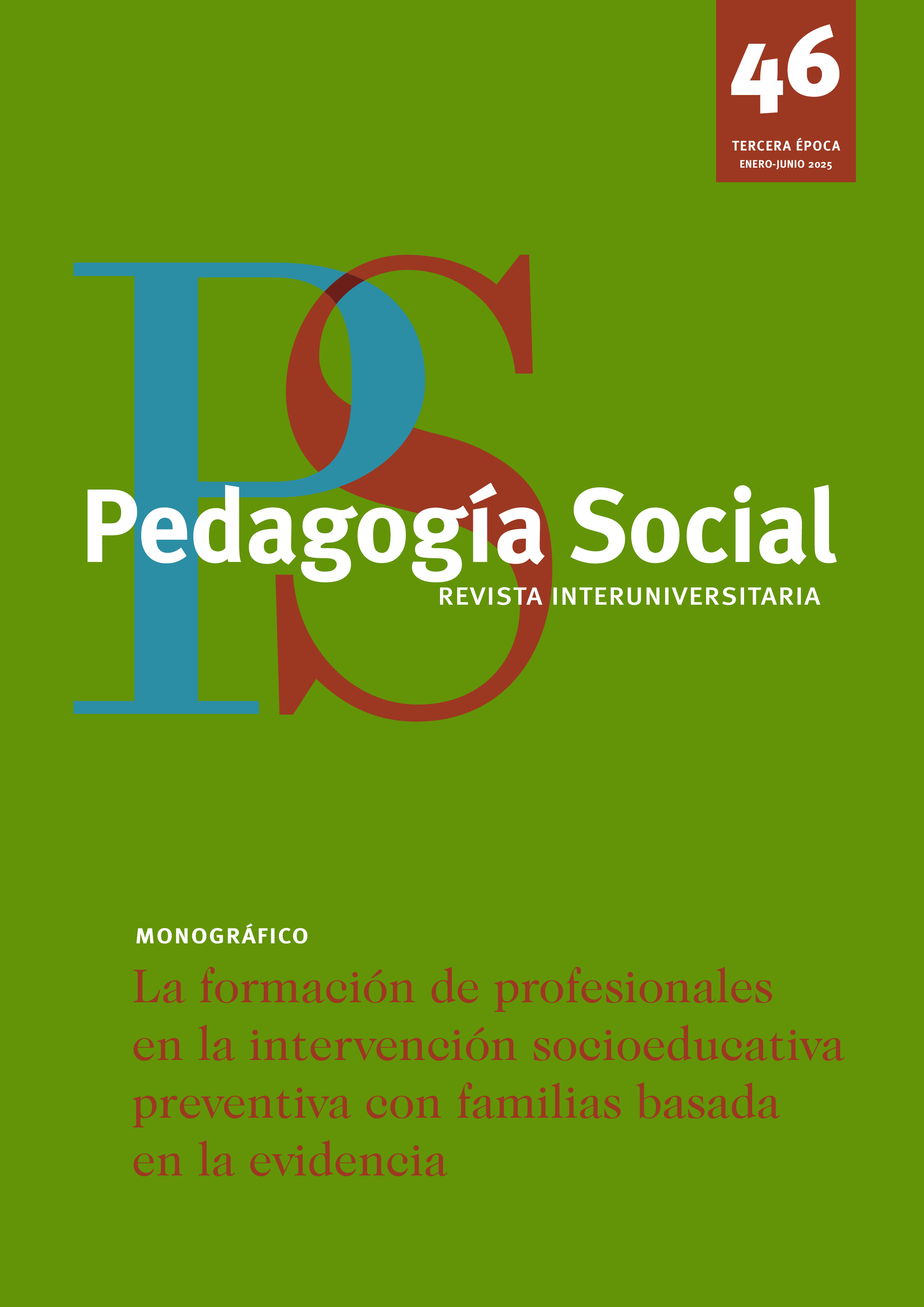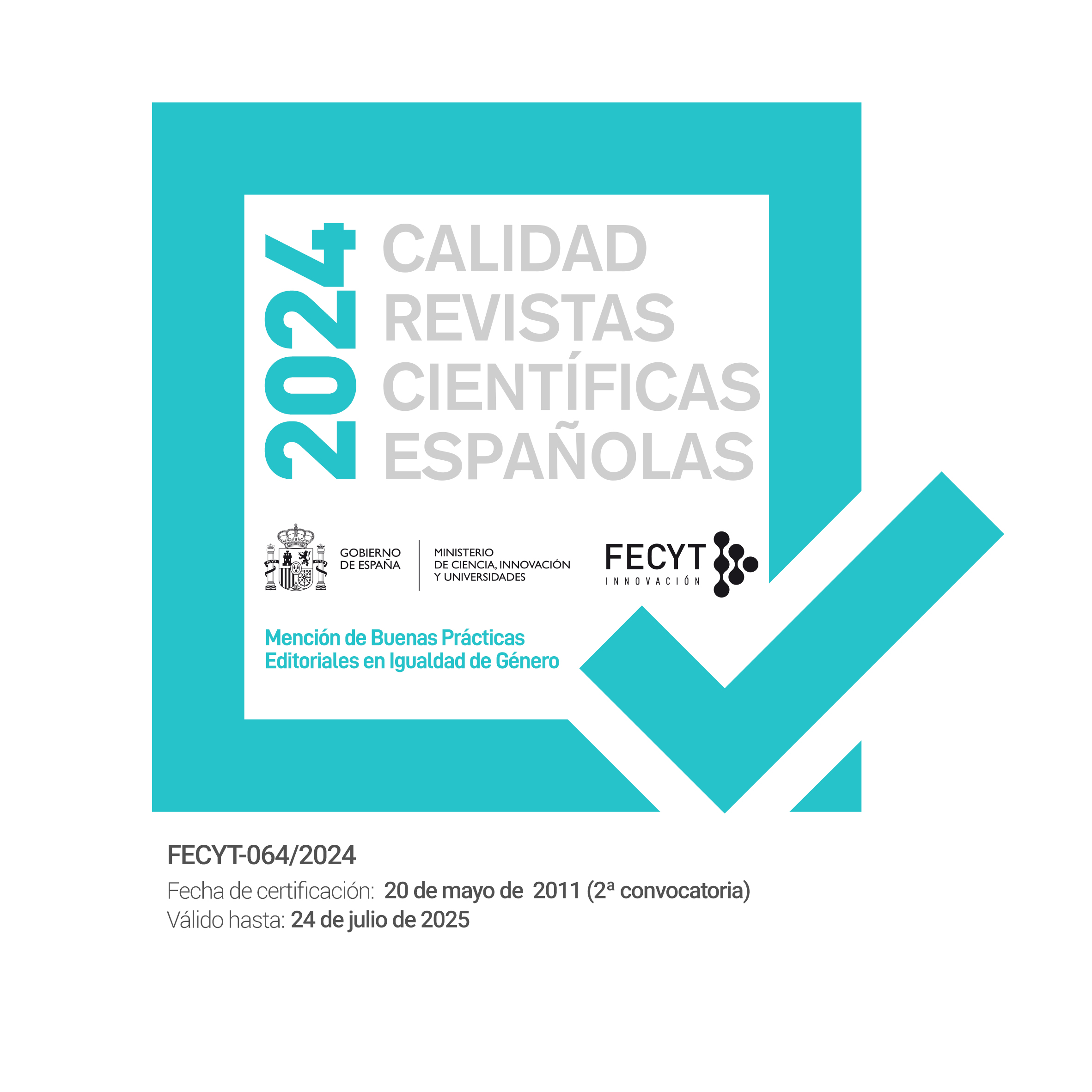Acciones pedagógicas desde el trabajo social y la teoría del género entorno al stalking: una revisión sistemática
DOI:
https://doi.org/10.7179/PSRI_2025.46.08Palabras clave:
Violencia doméstica, violencia de género, control, vigilancia, stalkingResumen
El stalking refiere a las conductas de vigilancia y de control reiteradas y sin consentimiento de un sujeto respecto a otro, que producen efectos negativos en el bienestar de las personas y representan una forma de ejercer la violencia en pareja. Se realizó una revisión sistemática con el objetivo de caracterizar las acciones pedagógicas a partir de la teoría del género que se realizan desde el trabajo social entorno al stalking. Para ello se aplicó el protocolo PRISMA y se utilizaron las palabras clave (stalking & “social work”), (stalking & “trabajo social”), (control & “trabajo social”) y (vigilancia & “trabajo social”) en las bases de datos de Scopus, Web of Science, Scielo, Dialnet y PubMed. Se incluyeron un total de 17 documentos publicados entre 2005 y 2023. Los resultados revelaron que el trabajo social fundamenta las intervenciones a partir de una perspectiva epistemológica principalmente positivista y una perspectiva ontológica basada en las capacidades de los sujetos y la violencia de género. En este sentido, los estudios analizados denotan propuestas de intervención respecto al stalking basadas principalmente a partir de los modelos psicodinámicos y sistémicos. No obstante, también se incluyen propuestas pedagógicas desde los diferentes ámbitos sociales, especialmente a partir de modelos cognitivo-conductuales.
Descargas
Citas
Alemán-Salcedo, E. y Páez-Cuba, L. D. (2021). La violencia de género en el ámbito de la pareja y la expareja. Reflexiones socio-jurídicas en torno a la protección integral de la víctima en Cuba y España. Revista Estudios del Desarrollo Social: Cuba y América Latina, 9(2), 1-22. http://scielo.sld.cu/scielo.php?script=sci_abstract&pid=S2308-01322021000200011
Alonso-Ruido, P., Estévez, I., Varela-Portela, C. y Sotelino-Losada, A. (2024). Sextorsión: una estrategia de violencia sexual online en el estudiantado universitario. Pedagogía Social. Revista Interuniversitaria, 45, 29-43. doi:10.7179/PSRI_2024.45.0
Arteaga-Botello, N. (2013). Perspectivas teóricas de la violencia: modos epistémicos. Fermentum. Revista Venezolana de Sociología y Antropología, 23(66),33-56. https://www.redalyc.org/articulo.oa?id=70538668003
Bosch-Fiol, E. y Ferrer-Perez, V. A. (2019). El Modelo Piramidal: alternativa feminista para analizar la violencia contra las mujeres. Revista Estudos Feministas, 27, 1-14. doi:10.1590/1806-9584-2019v27n254189
Calderón Guerrero, R. A. (2019). Violencia en el noviazgo, una revisión teórica (Tesis de licenciatura). Universidad Señor de Sipán. https://repositorio.uss.edu.pe/handle/20.500.12802/6099
Casanueva-Sanz, I. (2022). Violencia de género y agravante de discriminación en el delito de stalking. En D., Benito-Sánchez y M. S., Gil-Nobajas (Coords.), Alternativas político-criminales frente al derecho penal de la aporofobia (pp. 269-296). Tirant humanidades.
Cubillos, N. S., Charry, V. C. G., Losada, L. V. Z. y Usme, O. S. D. (2020). Intervenciones en violencia de género en pareja: Artículo de Revisión de la Literatura. Revista Cuidarte, 11(3), 2-30. doi:10.15649/cuidarte.980
de Alencar-Rodrigues, R. y Cantera, L. (2012). Violencia de género en la pareja: Una revisión teórica. Psico, 41(1), 116-126. https://ddd.uab.cat/record/130820
Dos Anjos, P. C. y Do Valle, M. D. T. (2023). Entendimientos iniciales sobre el stalking. Dictum-Revista de Ciencias Jurídicas y Políticas| Universidad Yacambú, 2(1), 5-22. https://revista.uny.edu.ve/ojs/index.php/dictum/article/view/292
Estrella, Á. M. (2022). Stalking y cyberstalking: Cuando la digitalización tiene consecuencias negativas. Análisis jurídico penal. Su aplicación en España en los últimos 5 años (2017-2021). En J., Jorge-Vázquez y J. S. Ñáñez-Alonso (Coords.), Retos económicos empresariales y jurídicos del siglo XXI: Digitalización, globalización y desarrollo sostenible (pp. 56-104). Tirant humanidades.
García-Peñalvo, F. J. (2022). Desarrollo de estados de la cuestión robustos: Revisiones Sistemáticas de Literatura. Education in the Knowledge Society, 23(1), 1-22. doi: 10.14201/eks.28600
González, P. G. (2019). La cultura como condición de paz y la paz como condición de cultura en el pensamiento latinoamericano. Utopía y Praxis Latinoamericana, 24(1), 43-66. https://redined.educacion.gob.es/xmlui/handle/11162/190006
González, P., Hernández, F. y Prats, G. (2020). Mecanismos alternativos en la solución de conflictos para la construcción de una cultura de paz. Revista ciencias de la documentación, 7(1),15-23. https://dialnet.unirioja.es/servlet/articulo?codigo=8132546
González-Gijón, G., Jiménez-Ríos, F. J., Ruíz-Garzón, F. y Soriano-Díaz, A. (2024). Autopercepción de la violencia en la pareja en el alumnado del grado en educación social. Pedagogía Social. Revista Interuniversitaria, 45, 15-28. doi:10.7179/PSRI_2024.45.0
Horszczaruk, E. y Zanatta, D. C. (2023). Stalking e Cyberstalking:: os primeiros impactos da criminalização da conduta no ordenamento jurídico brasileiro. Revista Eletrônica Direito & TI, 1(15), 178-209. https://direitoeti.com.br/direitoeti/article/view/126
Jiménez-Bautista, F. (2019). Una educación social que busca una cultura de paz. Educación social: Revista de intervención socioeducativa, (72), 13-34. https://redined.educacion.gob.es/xmlui/handle/11162/190006
Leal-Leal, G., Hernández-Flórez, N., Leal-Leal, K., Torrado-Vargas, R., Klimenko, O. y Hernandez-Flórez, J. (2023). Enfoque etnometodológico para el abordaje de la violencia escolar en una institución de educación básica. Revista Innova Educación, 5(3), 85-105. https://revistainnovaeducacion.com/index.php/rie/article/view/875
Martínez-Suarez, M., Galarza-Bogotá, E. Y., García-Gómez, A. M. y Rojas-Bonilla, Y. K. (2021). Intervención del trabajador social en casos de violencia contra la mujer, interpretación fenomenológica desde la práctica profesional. Conrado, 17(81), 410-418. http://scielo.sld.cu/scielo.php?script=sci_abstract&pid=S1990-86442021000400410&lng=es&nrm=iso
Organización de Naciones Unidas [ONU] (2015). Objetivo 5: Lograr la igualdad entre los géneros y empoderar a todas las mujeres y las niñas. https://www.un.org/sustainabledevelopment/es/gender-equality/
Pérez-Otero, V. (2021). Pedagogía social y educación social. Revista Educação em Questão, 59(59), 1-22. doi:10.21680/1981-1802.2021v59n59id24018
Piedra, J., Rosa-Martín, J. J. y Muñoz-Dominguez, M.C. (2018). Intervención y prevención de la violencia de género: un acercamiento desde el trabajo social. Trabajo Social Global 8(14), 195-216. doi:10.30827/tsg-gsw.v8i14.6595
Reina-Barreto, J. A. (2021). Victimización y perpetración de violencia en pareja adolescente y redes de apoyo en Colombia. Análisis con perspectiva de género. Prospectiva, (32), 125-150. doi:10.25100/prts.v0i32.9590
Rodríguez, E. C. y Torres, G. C. (2021). Acercamiento a la intervención de las profesionales del Trabajo Social en materia de violencia de género en dos ciudades de México. Itinerarios de Trabajo Social, (1), 37-44. doi:10.1344/its.v0i1.32478
Tapia-Izquierdo, C. (2019). Mujeres víctimas de violencia de género, trabajo social y los equipos psicosociales en los Juzgados de Violencia de Género: una revisión de la literatura. Universidad de Valladolid. http://uvadoc.uva.es/handle/10324/39860
Villa-Rueda, A. A., Váldez-Montero, C., Jímenez-Vázquez, V., Mendoza-Catalán, G., Domínguez-Chávez, C. J. y Cisneros-Ruiz, B. (2022). Intervenciones para prevenir violencia de pareja en población latina e hispano-americana joven: una revisión sistemática. Alternativas. Cuadernos De Trabajo Social, 29(1), 24–47. doi:10.14198/ALTERN.19764
Villanueva, J. G., Ramírez, C. I. H. y Hernández, O. Y. A. (2021). De la violencia al amor, la desmitificación romántica: un análisis con perspectiva de género. Revista de Psicología de la Universidad Autónoma del Estado de México, 10(20), 56-79. https://revistapsicologia.uaemex.mx/article/view/16710
Estudios incluidos en la revisión bibliográfica:
Aguirre del Busto, R. y Delgado González, M. (2005). Alcoholismo y convivencia femenina: Una propuesta de influencias educativas en la comunidad. Humanidades Médicas, 5(2), 1-25. http://scielo.sld.cu/scielo.php?pid=S1727-81202005000200004&script=sci_arttext
Bautista-Miranda, M., Jiménez, V. Z. y Sánchez, M. (2020). Rasgos de la violencia psicológica en las alumnas en relaciones de noviazgo, en la Unidad Académica Profesional Chimalhuacán (UAEMEX). Trabajo Social UNAM, (23-24), 123-138. https://revistas.unam.mx/index.php/ents/article/view/77475
Brookfield, K., Fyson, R. y Goulden, M. (2023). Technology-Facilitated Domestic Abuse: An under-Recognised Safeguarding Issue? The British Journal of Social Work, 00, 1-18. doi:10.1093/bjsw/bcad206
Cho, H., Hong, J. S. y Logan, T. K. (2012). An ecological understanding of the risk factors associated with stalking behavior: Implications for social work practice. Affilia, 27(4), 381-390. doi:10.1177/0886109912464474
Leitz, M. A. y Theriot, M. T. (2005). Adolescent Stalking: a review. Journal of Evidence-Based Social Work, 2(3-4), 97-112. doi:10.1300/J394v02n03_07
Maya-Pérez, E., Galindo, J. y de Jesús-Jiménez, M. (2019). La ira y los nervios como malestares emocionales en la conyugalidad a distancia. Trabajo Social, 21(2), 27-51. doi:10.15446/ts.v21n2.75263
Mehr, J. B., Bennett, E. R., Price, J. L., de Souza, N. L., Buckman, J. F., Wilde, E. A., Tate. D. F., Marshall, A. D., Dams-O'Connor, K. y Esopenko, C. (2023). Intimate partner violence, substance use, and health comorbidities among women: a narrative review. Frontiers in Psychology, 13, 1-14. doi:10.3389/fpsyg.2022.1028375
Murugan, V., Holzer, K. J., Termos, M. y Vaughn, M. (2021). Intimate partner violence among pregnant women reporting to the emergency department: findings from a nationwide sample. BMJ Sexual & Reproductive Health, 47(3), 1-6. doi:10.1136/bmjsrh-2020-200761
Nikupeteri, A. (2017). Professionals’ critical positionings of women as help-seekers: Finnish women’s narratives of help-seeking during post-separation stalking. Qualitative Social Work, 16(6), 793-809. doi:10.1177/1473325016644315
Nikupeteri, A., Laitinen, M., Gupta, A. y Mikkonen, E. (2023). Using the Capability Approach in Social Work with Children Experiencing Post-Separation Parental Stalking. The British Journal of Social Work, 53(2), 900-920. doi:10.1093/bjsw/bcac163
Reina-Barreto, J. A. (2021) Relación entre violencia de género por la pareja y apoyo social en mujeres colombianas. Análisis con perspectiva de género. Cuadernos de Trabajo Social, 34(2), 301-315. https://dx.doi.org/10.5209/cuts.72690
Rodríguez, R., Gómez-Contreras, S. P. y Falla-Ramírez, U. (2020). Del espacio disciplinario a una biopolítica de la intervención en violencia y muerte de mujeres. Tábula Rasa, 34(1), 289-304. doi:10.25058/20112742.n34.14
Rodríguez-Venegas, V. y Duarte-Hidalgo, C. (2023). La crisis sobre otra crisis: maternidades, cuerpos/emociones y pandemia en la región de Atacama, Chile. Trabajo Social, 25(1), 83-108. doi:10.15446/ts.v25n1.101941
Spencer, K., Haffejee, M., Candy, G. y Kaseke, E. (2016). Intimate partner violence at a tertiary institution. South African Medical Journal, 106(11), 1129-1133. https://www.ajol.info/index.php/samj/article/view/150198
Voth Schrag, R. J., Wood, L. G., Hoefer, S. y Busch-Armendariz, N. (2021). # Metoosocialworkeducation: Exposure to Interpersonal Violence Among Social Work Students. Journal of Social Work Education, 57(3), 489-504. doi:10.1080/10437797.2019.1671264
Wahab, R. A., Chan, M., Vijapura, C., Brown, A. L., Asghar, E., Frazee-Katz, C. y Mahoney, M. C. (2021). Intimate partner violence and the role of breast imaging centers. Journal of Breast Imaging, 3(4), 482-490. doi:10.1093/jbi/wbab046
Wennerstrom, A., Haywood, C., Wallace, M., Sugarman, M., Walker, A., Bonner, T., ... y Theall, K. (2018). Creating safe spaces: a community health worker-academic partnered approach to addressing intimate partner violence. Ethnicity & Disease, 28(Suppl. 2), 317-324. doi:10.18865/ed.28.S2.317
Westbrook, L. (2012). Internet access and use in domestic violence shelters: Policy, capacity, and management barriers. Journal of Social Work, 13(1), 30-53. doi:10.1177/1468017311435184
Publicado
Cómo citar
Número
Sección
Licencia

Esta obra está bajo una licencia internacional Creative Commons Atribución-NoComercial-CompartirIgual 4.0.
Derechos de reproducción y archivo
La versión publicada de los artículos podrá ser autoarchivada por sus autores en repositorios institucionales y temáticos de acceso abierto. No obstante la reutilización total o parcial de los mismos en nuevos trabajos o publicaciones deberá ser autorizada por Pedagogía Social. Revista Interuniversitaria.
Los trabajos publicados deberán ser citados incluyendo el título de la Revista, Pedagogía Social. Revista Interuniversitaria, nº, páginas y año de publicación.
Responsabilidades éticas
Pedagogía Social. Revista Interuniversitaria no acepta material publicado anteriormente en otros documentos. Los/as autores/as son responsables de obtener los permisos oportunos para reproducir parcialmente material de otras publicaciones y citar correctamente su procedencia. Estos permisos deben solicitarse tanto al autor/a como a la editorial que ha publicado dicho material.
Es obligación de Pedagogía Social. Revista Interuniversitaria detectar y denunciar prácticas fraudulentas.
En la lista de autores/as firmantes deben figurar únicamente aquellas personas que han contribuido intelectualmente al desarrollo del trabajo.
La revista espera que los/as autores/as declaren cualquier asociación comercial que pueda suponer un conflicto de intereses en conexión con el artículo remitido.
Los autores deben mencionar en el manuscrito, preferentemente en el apartado del método, que los procedimientos utilizados en los muestreos y controles han sido realizados tras la obtención de consentimiento informado.
La revista no utilizará ninguno de los trabajos recibidos con otro fin que no sea el de los objetivos descritos en estas normas.
Aviso de derechos de autor/a
© Pedagogía Social. Revista Interuniversitaria. Los originales publicados en las ediciones impresa y electrónica de esta Revista son propiedad del Pedagogía Social. Revista Interuniversitaria, siendo necesario citar la procedencia en cualquier reproducción parcial o total.
Salvo indicación contraria, todos los contenidos de la edición electrónica se distribuyen bajo una licencia de uso y distribución “Creative Commons Reconocimiento-No Comercial 3.0 España” (CC-by-nc). Puede consultar desde aquí la versión informativa y el texto legal de la licencia. Esta circunstancia ha de hacerse constar expresamente de esta forma cuando sea necesario.






